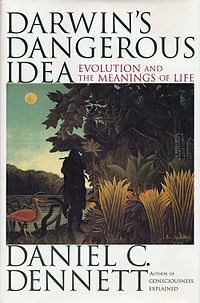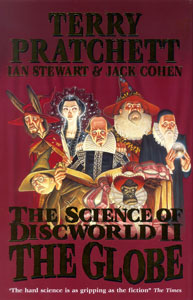
Darwin's Dangerous Idea: Evolution and the Meanings of Life is a 1995 book by the philosopher Daniel Dennett, in which the author looks at some of the repercussions of Darwinian theory. The crux of the argument is that, whether or not Darwin's theories are overturned, there is no going back from the dangerous idea that design might not need a designer. Dennett makes this case on the basis that natural selection is a blind process, which is nevertheless sufficiently powerful to explain the evolution of life. Darwin's discovery was that the generation of life worked algorithmically, that processes behind it work in such a way that given these processes the results that they tend toward must be so.

The mind is that which thinks, imagines, remembers, wills, and senses, or in other words is the set of faculties responsible for such phenomena. The mind is also associated with experiencing perception, pleasure and pain, belief, desire, intention, and emotion. The mind can include conscious and non-conscious states as well as sensory and non-sensory experiences.

The world is the totality of entities, the whole of reality, or everything that exists. The nature of the world has been conceptualized differently in different fields. Some conceptions see the world as unique while others talk of a "plurality of worlds". Some treat the world as one simple object while others analyze the world as a complex made up of parts.
Solipsism is the philosophical idea that only one's mind is sure to exist. As an epistemological position, solipsism holds that knowledge of anything outside one's own mind is unsure; the external world and other minds cannot be known and might not exist outside the mind.

Ian Nicholas Stewart is a British mathematician and a popular-science and science-fiction writer. He is Emeritus Professor of Mathematics at the University of Warwick, England.
Intelligence has been defined in many ways: the capacity for abstraction, logic, understanding, self-awareness, learning, emotional knowledge, reasoning, planning, creativity, critical thinking, and problem-solving. It can be described as the ability to perceive or infer information; and to retain it as knowledge to be applied to adaptive behaviors within an environment or context.
A lie-to-children is a simplified, and often technically incorrect, explanation of technical or complex subjects employed as a teaching method. Educators who employ lies-to-children do not intend to deceive, but instead seek to 'meet the child/pupil/student where they are', in order to facilitate initial comprehension, which they build upon over time as the learner's intellectual capacity expands. The technique has been incorporated by academics within the fields of biology, evolution, bioinformatics and the social sciences.

The Science of Discworld II: The Globe is a 2002 book written by British novelist Terry Pratchett and science writers Ian Stewart and Jack Cohen. It is a sequel to The Science of Discworld, and is followed by The Science of Discworld III: Darwin's Watch.

The Science of Discworld is a 1999 book by novelist Terry Pratchett and popular science writers Ian Stewart and Jack Cohen. Three sequels, The Science of Discworld II: The Globe, The Science of Discworld III: Darwin's Watch, and The Science of Discworld IV: Judgement Day, have been written by the same authors.

The Science of Discworld III: Darwin's Watch (2005) is a book set on the Discworld, by Terry Pratchett, Ian Stewart and Jack Cohen. It is the sequel to The Science of Discworld and The Science of Discworld II: The Globe.
Extelligence is a term coined by Ian Stewart and Jack Cohen in their 1997 book Figments of Reality. They define it as the cultural capital that is available to us in the form of external media
This glossary of philosophy is a list of definitions of terms and concepts relevant to philosophy and related disciplines, including logic, ethics, and theology.
Metaphysical naturalism is a philosophical worldview which holds that there is nothing but natural elements, principles, and relations of the kind studied by the natural sciences. Methodological naturalism is a philosophical basis for science, for which metaphysical naturalism provides only one possible ontological foundation. Broadly, the corresponding theological perspective is religious naturalism or spiritual naturalism. More specifically, metaphysical naturalism rejects the supernatural concepts and explanations that are part of many religions.

Perfect Imperfection: First third of progress is a science fiction novel published in 2004 by the Polish science fiction writer Jacek Dukaj, ostensibly as the first part of a planned trilogy. It was published in Poland by Wydawnictwo Literackie.
A species concept is a framework for differentiating different species. There are at least 26 recognized species concepts, and difficulty in reconciling these various definitions is collectively called the species problem. A species concept that works well for sexually reproducing organisms such as birds may be useless for species that reproduce asexually, such as bacteria. The scientific study of the species problem has been called microtaxonomy.

The Collapse of Chaos: Discovering Simplicity in a Complex World (1994) is a book about complexity theory and the nature of scientific explanation written by biologist Jack Cohen and mathematician Ian Stewart.

The evolutionary origin of religion and religious behavior is a field of study related to evolutionary psychology, the origin of language and mythology, and cross-cultural comparison of the anthropology of religion. Some subjects of interest include Neolithic religion, evidence for spirituality or cultic behavior in the Upper Paleolithic, and similarities in great ape behavior.
Systems theory in anthropology is an interdisciplinary, non-representative, non-referential, and non-Cartesian approach that brings together natural and social sciences to understand society in its complexity. The basic idea of a system theory in social science is to solve the classical problem of duality; mind-body, subject-object, form-content, signifier-signified, and structure-agency. Systems theory suggests that instead of creating closed categories into binaries (subject-object), the system should stay open so as to allow free flow of process and interactions. In this way the binaries are dissolved.
Romantic epistemology emerged from the Romantic challenge to both the static, materialist views of the Enlightenment (Hobbes) and the contrary idealist stream (Hume) when it came to studying life. Romanticism needed to develop a new theory of knowledge that went beyond the method of inertial science, derived from the study of inert nature, to encompass vital nature. Samuel Taylor Coleridge was at the core of the development of the new approach, both in terms of art and the 'science of knowledge' itself (epistemology). Coleridge's ideas regarding the philosophy of science involved Romantic science in general, but Romantic medicine in particular, as it was essentially a philosophy of the science(s) of life.

Transactionalism: An Historical and Interpretive Study, was written in 1966 by philosopher Trevor J. Phillips (1927–2016) and first published in December 2013. At the time of its publication, it was the first, most comprehensive account of the origins and evolution of the modern historical, philosophical, psychological, and educational philosophy known as transactionalism.











